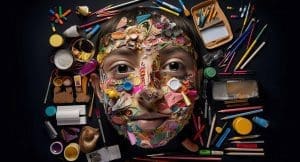
Introduction to Expressive Arts Therapies (7HR)
Journaling. Poetry. Movement. Art making. Storytelling. Creating music. Sculpting. Doodling. Photography. Role play.
This is just a sampling of the many creative ways therapists can use artistic self-expression for healing and personal growth. During this in-depth, full-day training, we will discuss the varied nature of expressive arts therapies in depth, examining a large number of creative modalities. You’ll gain an understanding of the richness the expressive arts can provide for your clients, and my goal is for you to be inspired to explore these modalities even further on your own.
Most importantly, because we will have a full day, you’ll learn a wide variety of ways that you can use expressive arts activities with your clients. This will be an interactive, experiential training, so please be sure to have your favorite journal or notebook on hand!
Upon completion of this training, participants will be able to:
- Identify the components of what makes something “expressive arts therapy”
- Implement various examples of expressive arts therapies in their practices
- Determine how utilizing expressive arts can lead to healing and personal growth
- Define the ethics and clinical limitations of using different expressive arts activities within their scope of practice
- Demonstrate at least 10 different types of expressive arts activities that can be used with clients
Social workers completing this course receive 7 Clinical asynchronous continuing education credits.
For other board approvals, this course qualifies for 7 hours of Clinical continuing education training.
Course Instructor: Dreya Blume, MSW, LCSW
Recording Date: 01/20/2024
Recorded Live Webinar with downloadable presentation slides and/or handouts, evaluation, and a required quiz. The learner is required to pass with a 70% or higher to achieve the CE certificate of completion. The learner is able to reset the test until a satisfactory score is achieved. CE Training Workshops, LLC, provider #1770, is approved as an ACE provider to offer social work continuing education by the Association of Social Work Boards (ASWB) Approved Continuing Education (ACE) program. Regulatory boards are the final authority on courses accepted for continuing education credit. ACE provider approval period: 8/2/2022 – 8/2/2025. CE Training Workshops, LLC has been approved by NBCC as an Approved Continuing Education Provider, ACEP No. 7091. Programs that do not qualify for NBCC credit are clearly identified. CE Training Workshops, LLC is solely responsible for all aspects of the programs. System Requirements: Firefox, Chrome, Brave, Safari, Edge on any modern operating system (Windows, MacOS, Linux, Android, iOS). A desktop browser is recommended. We do not provide support resources for issues encountered using a mobile device. For more information about our policies and board approval statements, please visit our FAQS page.
Dreya Blume, MA, LCSW is a licensed clinical social worker, with her MSW from Radford University and an MA in anthropology from the University of Hawaii. Dreya has twenty years of experience working in mental health, from case management to intensive in-home services to leading groups for addicts in recovery.
Introduction to Expressive Arts Therapies (7 HR) Syllabus
I. Foundations of Expressive Arts Therapy
- Combines psychology with creative modalities for healing
- Emphasizes self-expression through sensory engagement
- Intermodal approach uses multiple art forms fluidly
- Supports clients who struggle with verbal expression
II. Modalities and Forms of Creative Expression
- Language Arts: journaling, poetry, storytelling
- Visual Arts: collage, art therapy, clay therapy
- Dramatic Arts: psychodrama, role play, theater
- Symbolic Worlds: sandtray, play therapy
- Movement & Sound: dance, music, body awareness, breathwork
III. Neuroscience and Healing Potential
- Creative expression engages both mind and body
- Stimulates imagination, emotional regulation, and connection
- Promotes non-verbal communication and holistic integration
- Facilitates access to unconscious material through metaphor
IV. Guided Techniques and Structured Activities
- Scribble drawing and six-box doodles
- Lists of 100 for reflection and self-discovery
- Dialogues with emotions, parts, objects, and subpersonalities
- “Unsent letters” for emotional release and closure
V. Journaling and Writing Interventions
- Therapeutic prompts for insight and emotional processing
- Structured forms like sensory poems and acrostics
- Rituals tied to writing for symbolic transformation
- Creative storytelling for integrating personal narratives
VI. Poetry, Music, and Movement-Based Practices
- Poetry therapy enhances insight, connection, and catharsis
- Song lyrics and music as discussion and expression tools
- Dance/movement therapy supports emotional integration
- Ritual and spiritual practices add depth and grounding
VII. Visual and Symbolic Therapies
- Collage as an accessible tool for emotional exploration
- Mandala creation for introspection and symbolic meaning
- Sandtray and symbolic world play to explore identity and relationships
- Photography and phototherapy for self-reflection and narrative revision
VIII. Drama, Psychodrama, and Role Exploration
- Drama therapy for storytelling, catharsis, and social learning
- Psychodrama reenacts personal narratives for healing
- Clients act out roles to shift perspective and emotional insight
- Creative performance as a means to explore self and others
IX. Ethics and Scope of Practice
- Therapists should understand limits of expressive arts within licensure
- Differences between expressive arts therapy and creative interventions
- Pathways to credentialing as a REAT (Registered Expressive Arts Therapist)
- Importance of ethical labeling and competence in modality use
X. Creativity and the Clinician
- Encouragement to integrate creativity into clinical practice
- Therapeutic power lies in the client-clinician-artwork relationship
- Creativity as a tool for growth, spontaneity, and healing
- “Anything can be therapeutic when approached with intention and care”


